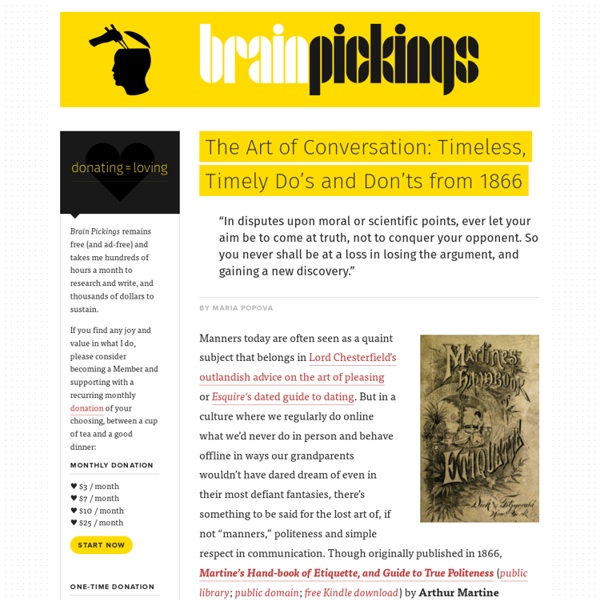The Art of Conversation: Timeless, Timely Do's and Don'ts from 1866

What Tumblr Is and How To Use It: A Practical Guide
You may have noticed a lot of people on Twitter grumbling about Tumblr’s outages, the latest of which started on Saturday and have continued, in sometimes day-long chunks, through today. The social network’s problems come at a time when their userbase is growing rapidly, along with their pageviews, though this stumble threatens to curtail that. “…keeping up with growth has presented more work than our small team was prepared for,” says the staff blog. “But we are determined and focused on bringing our infrastructure well ahead of capacity as quickly as possible.” If you’re not one of Tumblr’s 7.5 million users, you might not even know what the heck it is or why there’s such a fuss. Tumblr is a microblogging site that sits somewhere between Twitter and a traditional blog. Depending on the type of post, Tumblr serves up a different template. Just as with Twitter, users must Follow a Tumblr blog to keep up with it. Tumblr makes link-blogging easy. Tumblr Tips 9 11 Google +6 4
The strength of ‘weak signals’
As information thunders through the digital economy, it’s easy to miss valuable “weak signals” often hidden amid the noise. Arising primarily from social media, they represent snippets—not streams—of information and can help companies to figure out what customers want and to spot looming industry and market disruptions before competitors do. Sometimes, companies notice them during data-analytics number-crunching exercises. Or employees who apply methods more akin to art than to science might spot them and then do some further number crunching to test anomalies they’re seeing or hypotheses the signals suggest. Engaging at the top For starters, given the fluid nature of the insights that surface, it’s often useful to get senior leaders actively involved with the social-media sources that give rise to weak signals. To find out, the executive commissioned research to quantify what had started out as a qualitative hunch. Listening and mapping Spotting visual clues Crossing functions
The Seven Deadly Sins of Expat Networking : Blog
Wednesday 16th May 2012 Quite often the success of an expatriate assignment can hinge on the speed at which you meet like-minded people with whom you can form friendships and who can help you to settle into life away from home. In order to do this it is often extremely important that you start to network with fellow expatriates and locals alike and many expats are all too aware of the need to get out there and socialize. However, many expats make the same mistakes that impact their ability to meet new friends. Here is our lowdown of seven mistakes that expats should avoid when meeting new people. 1) Judging on First Impressions Do you ever find yourself meeting new people and instantly making a decision as to whether they are a potential suitable friend for you or not? 2) Failing to Follow Up When you are new to a country you will meet a lot of new people and you will find yourself with a large number of cards and contact numbers. 3) Not Listening 4) Talking About Yourself Too Much
The Debunking Handbook: now freely available for download
Posted on 27 November 2011 by John Cook The Debunking Handbook, a guide to debunking misinformation, is now freely available to download. Although there is a great deal of psychological research on misinformation, there's no summary of the literature that offers practical guidelines on the most effective ways of reducing the influence of myths. The Debunking Handbook boils the research down into a short, simple summary, intended as a guide for communicators in all areas (not just climate) who encounter misinformation. The Handbook explores the surprising fact that debunking myths can sometimes reinforce the myth in peoples' minds. It also looks at a key element to successful debunking: providing an alternative explanation. The Authors: John Cook is the Climate Change Communication Fellow for the Global Change Institute at the University of Queensland. Professor Lewandowsky is an Australian Professorial Fellow and a cognitive scientist at the University of Western Australia.
The 7 Greatest Communication Successes Of 2011
Welcome to Part 2 of my annual list of who’s been naughty and who's been nice as a speaker or communicator. This week, the winners. Occupy Wall Street: "We are the 99%" is a brilliant use of language to tell an important story. The OWS group has channeled the anger of citizens toward the businesses and business leaders they believe have benefited at their expense. Like other successful slogans, the statement at once connects the dots for supporters: There are heroes, villains, and an emotional component that is plaintive yet strong. I believe this rallying cry is here to stay and demands for attention and redress will grow. Chad "Ochocinco" Johnson: We can quibble over the nature of this pro-football player’s public "sharing," but what we should agree on is the skill with which he has managed his enormously successful personal brand. Steve Jobs: Jobs was the greatest CEO presenter of all time. As with the failures, I'm sure I left someone out. Happy New Year!
Related:
Related:



